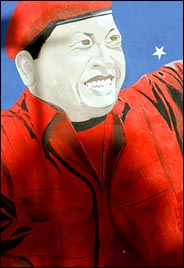Untitled Document
 |
A mural of President Hugo
Chávez on the wall of a government complex in Caracas that houses a subsidized
food market and two factories. |
Firmly in power and his revolution now in overdrive, President Hugo
Chávez is moving fast to transform Venezuela's economy by
bucking free-market planning with what he calls 21st-century socialism: founding
state companies, seizing abandoned private factories and establishing thousands
of cooperatives and worker-run businesses.
The populist government is reorganizing the country's colossal oil industry,
taking a bigger share from private multinationals. Planners are reorganizing
the banking system, placing stringent restrictions on lending while creating
state banks. Venezuela is also developing a state-to-state barter system to
trade items as varied as cattle, oil and cement as far away as Argentina
and as near as Cuba,
its closest ally.
"It's impossible for capitalism to achieve our goals, nor is it possible
to search for an intermediate way," Mr. Chávez said a few months
ago, laying out his plans. "I invite all Venezuelans to march together
on the path of socialism of the new century."
According to many mainstream economists, the change is simply a mix of plans
taken from the protectionist policies of the 1960's and others adopted from
Cuba and countries of the former Soviet bloc. It may not be communism - as detractors
contend it is - but it mixes socialism with capitalism and what some call improvisation.
Many of the president's grandest plans are put into practice at the year-old
Ministry for the Popular Economy. Planners there have already created 6,840
cooperatives that employ 210,000 people nationwide, many producing for the state.
The banking system is crucial to the government's plans. Regulators tightly
control interest rates and demand that private banks devote 31.5 percent of
all loans to agricultural projects, housing construction, tourism and microcredits,
loans to tiny startup businesses.
The new measures - which include the seizure of factories, mines and fields
the government says are unproductive - are playing well domestically. Mr. Chávez
has an approval rating topping 70 percent.
"I'm not afraid of socialism and never have been," said Rivas Silvino,
who works in a diaper factory run by workers and managers under a state co-management
plan. "The world is afraid. I say, don't be afraid."
So far, no noticeable exodus of foreign companies operating in Venezuela has
occurred. Banks and oil companies are making record profits thanks to oil prices
that have left the country, the world's fifth-largest exporter, awash in petrodollars.
This year, the oil industry is generating $20 billion for the government, nearly
$8 billion more than last year.
Still, there is restlessness in the boardrooms, with executives worried about
government intervention, which is sometimes seen as haphazard and improvised.
Economists say the government has not made the investments needed in the oil
sector. And political analysts and mainstream economists warn of recession and
dourly note that foreign investment is about a third of what it was five years
ago. They say that Venezuela's vast oil profits give the illusion of prosperity
- the economy's growth rate is 9.3 percent - but that if prices fall, or Venezuela's
growing spending catches up, the economy could founder.
Domingo Maza Zavala, the director of the Central Bank, warned of recession
as soon as 2007. "There is uncertainty and instability because of the strategies
being used by the state," he said in an interview. "If there was a
strategy, defined, well established and clear and with objectives, this would
create a climate of confidence that could generate a recuperation of investments."
In the tumbledown barrios where Mr. Chávez draws much of his support,
it is easy to see why the new system has been warmly welcomed. The hills around
Caracas and the farms in the outback are filled with cooperatives and other
businesses in which the state plays an important role. Workers produce everything
from shoes to corn.
Aura Matos, 28, is a seamstress in a state-run textile factory that sells to
the state, a job she has held just a few weeks. "I was in my house, with
nothing to do, and President Chávez and God gave me this opportunity,"
Ms. Matos said as she took a break from sewing jeans and blouses.
One of the government's most ambitious ventures is a new state airline, price
$110 million so far. The airline, Conviasa, now has three planes, which regularly
serve Bogotá, Havana and other nearby destinations. It plans to expand
to 14 jets in about a year and travel as far as Beijing and Europe.
What about competition in this cutthroat industry? "The philosophy is
not to compete, but to cooperate with other airlines," said Wilmer Castro,
who as Venezuela's tourism minister oversees the airline. "Our policy is
to have fares that are lower than the others in the market."
Another project gives workers a stake in the ownership and management of tottering
private companies. In return, management - made up of the original owners and
the workers - receives government credits and other incentives.
"The businesses closed by the neoliberal system - factories and farms
- are reopening, but it's done by the people," said Elías José
Jaua, minister of the popular economy. "This is a state that has the duty
to push and support this."
The state is also founding a mining company, an iron and steel company, a tractor
factory and a state computer company, which Mr. Chávez says will produce
"Bolivarian computers" in honor of his guiding light, the 19th-century
independence hero Simón Bolívar. The government has even spoken
about acquiring nuclear technology from Brazil and Argentina - emphasizing that
it would be for peaceful purposes, like energy production or medical care.

